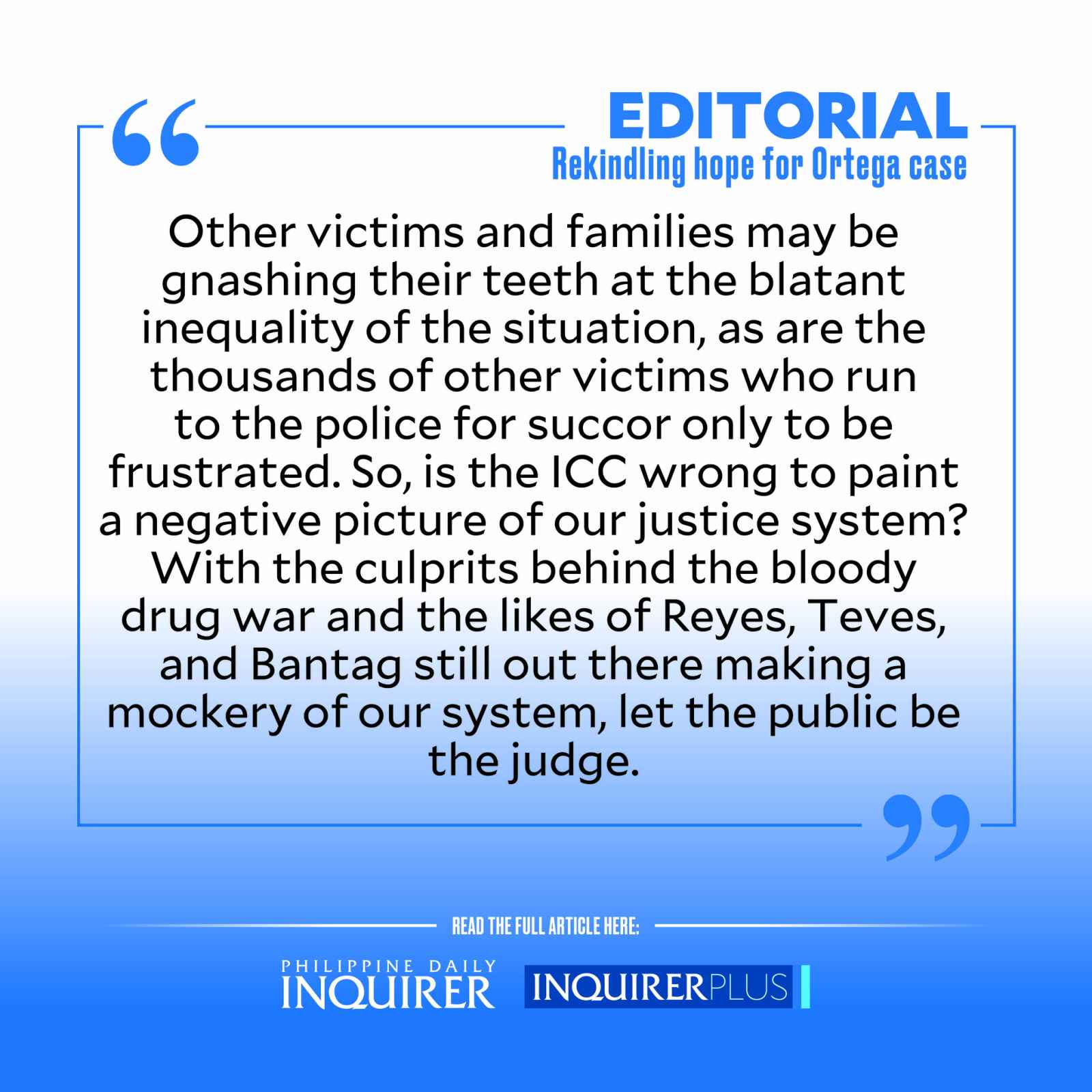Rekindling hope for Ortega case
The decade-long quest for justice by the family of slain broadcaster and environmental advocate Gerardo “Doc Gerry” Ortega has taken a positive turn with a decision by the Supreme Court ordering a Palawan court to resume trial for the 2011 killing. The high court, in a March 29 decision, also ordered the rearrest of former Palawan governor Joel Reyes, tagged mastermind of the Ortega murder, rekindling hope that the Ortega family will obtain justice.
“Our family is thankful that the Supreme Court sided with truth and justice. We have long hoped and prayed for the trial to continue. This fair decision restores our faith that, one day, we will find justice,” Ortega’s daughter Mika said.
Article continues after this advertisementThe saying “justice delayed is justice denied” could not be more apt for the saga of the Ortega case, which has dragged on for 12 years with conflicting resolutions by different panels of Department of Justice (DOJ) prosecutors and the Court of Appeals (CA). Ortega, who had vigorously opposed mining in Palawan, was shot and killed on Jan. 24, 2011, outside a used-clothes store in Barangay San Pedro in Puerto Princesa City as he left after his radio program. The confessed gunman, Marlon Recamata, was convicted and sentenced to life imprisonment in 2013. Reyes and his brother Mario, then mayor of Coron town, were tagged by Rodolfo Edrad, one of the then governor’s aides, as masterminds of the killing of Ortega. As is the case for powerful people accused of crimes, the Reyes brothers fled the country and were arrested in 2015 while living in Phuket, Thailand.
Their arrest, however, did not help in the progress of the trial. Instead, the Reyes brothers were successful in seeking the dismissal of the charges, citing a finding by a DOJ panel that there was no evidence against them. In 2018, CA Justice Normandie Pizzaro ordered the Palawan Regional Trial Court (RTC) Branch 52 to drop the charges. The CA then reversed this order in 2019, which the Supreme Court upheld in its order for resumption of trial. This means that after 12 years of languishing in the judicial holes, the Ortega case is finally going to proceed to trial.
While the high court decision is a welcome development, it ironically highlights the flaws in our justice system. The conflicting decision of prosecutors, for one, has caused undue delays and suspicions about the impartiality and fairness of our judicial process. Then there is also the ability of influential suspects to evade the long arm of the law. That the Reyes brothers were able to leave the country when all eyes were supposed to be on them for the high-profile case had also cast doubt on law enforcers and immigration personnel.
Article continues after this advertisementFollowing the high court’s decision, Judge Angelo Arizala of Palawan RTC Branch 52 has issued a warrant of arrest against Reyes. But as in 2011, Reyes is reportedly nowhere to be found again just as the Supreme Court ordered his rearrest. With the case practically back to square one, and the culprits again able to flee, the grieving Ortega family will likely be in for another long wait.
Is this a one-off case due to the influential personalities involved? Or is it a sign of a deeper, wider rot in the system? When the International Criminal Court (ICC) said the reason it was pursuing charges against the Philippine government for the drug war killings, the government protested vigorously, claiming it had a working police, prosecution, and court system.
But several cases belie the government’s claim, most involving prominent personalities who have managed to elude justice.
Another prominent case is that of suspended Negros Oriental congressman Arnolfo Teves Jr. who is accused of masterminding the killing of governor Roel Degamo along with eight of his followers. But the arrest of Teves was foiled because he was in the United States and subsequently refused to return despite sanctions imposed by the House leadership, which suspended him for “disorderly conduct.” Teves has refused to come back, citing threats to his life, and in the meantime, witnesses against him are one by one recanting their statements and walking away free.
The killing of another broadcaster, Percival “Percy Lapid” Mabasa, on Oct. 3, 2022, is yet another case that has barely moved. Despite a P2-million bounty put up by the DOJ for the arrest of former Bureau of Corrections chief Gerald Bantag, the alleged mastermind remains a fugitive. Are these personalities so powerful they can bend the entire system to their will? Other victims and families may be gnashing their teeth at the blatant inequality of the situation, as are the thousands of other victims who run to the police for succor only to be frustrated.
So, is the ICC wrong to paint a negative picture of our justice system? With the culprits behind the bloody drug war and the likes of Reyes, Teves, and Bantag still out there making a mockery of our system, let the public be the judge.

















